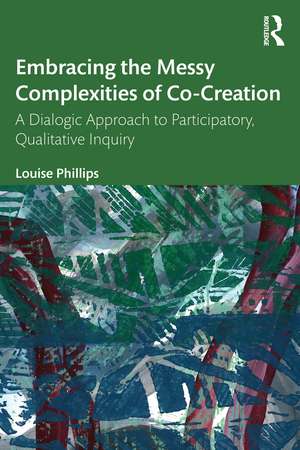Embracing the Messy Complexities of Co-Creation: A Dialogic Approach to Participatory Qualitative Inquiry
Autor Louise Phillipsen Limba Engleză Paperback – 16 dec 2024
This book offers an approach which recognises - and embraces - the messy complexities of co-creation. The approach is constructive – it revolves around creating openings for multiple voices; and, in particular, the voices of people with lived experience. And it is critical – it involves integrating critical, reflexive analyses of the intrinsic tensions in co-creation into the practice of research. The book brings participatory research into dialogue with poststructuralist, social constructionist and new materialist, posthumanist strands of qualitative inquiry. In an engaging and accessible way, the author weaves together personal storytelling and more detached analysis to illustrate her approach to producing and communicating knowledge as intertwined processes.
The book is written for all students and researchers with an interest in collaborative research practice.
| Toate formatele și edițiile | Preț | Express |
|---|---|---|
| Paperback (1) | 280.33 lei 3-5 săpt. | +19.20 lei 7-13 zile |
| Taylor & Francis – 16 dec 2024 | 280.33 lei 3-5 săpt. | +19.20 lei 7-13 zile |
| Hardback (1) | 1003.12 lei 6-8 săpt. | |
| Taylor & Francis – 16 dec 2024 | 1003.12 lei 6-8 săpt. |
Preț: 280.33 lei
Nou
Puncte Express: 420
Preț estimativ în valută:
53.64€ • 56.00$ • 44.39£
53.64€ • 56.00$ • 44.39£
Carte disponibilă
Livrare economică 15-29 martie
Livrare express 01-07 martie pentru 29.19 lei
Preluare comenzi: 021 569.72.76
Specificații
ISBN-13: 9781032369686
ISBN-10: 103236968X
Pagini: 248
Ilustrații: 24
Dimensiuni: 156 x 234 x 19 mm
Greutate: 0.36 kg
Ediția:1
Editura: Taylor & Francis
Colecția Routledge
Locul publicării:Oxford, United Kingdom
ISBN-10: 103236968X
Pagini: 248
Ilustrații: 24
Dimensiuni: 156 x 234 x 19 mm
Greutate: 0.36 kg
Ediția:1
Editura: Taylor & Francis
Colecția Routledge
Locul publicării:Oxford, United Kingdom
Public țintă
Academic, Postgraduate, and Professional ReferenceCuprins
Chapter 1: Offering a dialogic approach to conceptualizing co-creation. Chapter 2: Mapping the contested terrain of co-creation in participatory research and qualitative inquiry Chapter 3: Thinking with IFADIA – an overview. Chapter 4: Tracing the relational enactment of “co-creation”: the Parkinson’s Dance Research Project. Chapter 5: Working with the tension in co-creation between cultivating the creative process and producing specific results. Chapter 6: Conceptualising tensional temporalities and mutual care in co-creation. Chapter 7: A collaborative autoethnographic inquiry into “co-creation” from participants’ perspectives. Chapter 8: Fostering embodied experiential knowing in dialogic research communication. Chapter 9: Epilogue.
Recenzii
We rapidly approach a world condition in which we either collaborate or perish. Inquiry into the nature of dialogue, its potentials and limitations, is essential to our capacities to forge the future together. It is just here that the work of Louise Phillips is of central significance. Her scholarship, her sophisticated deliberations, and her experiences in participatory inquiry are without equal. All are reflected in this illuminating extension of her work into realms of embodied and artistic communication.
--Kenneth J. Gergen, Ph.D., Senior Research Professor in Psychology at Swarthmore College, and the President of the Taos Institute
Books on participatory research and related approaches often present what Erving Goffman would call the ''front stage'' to show its methods and techniques, impact and democratic potential. Louise Phillips dares to share the ''back-stage'' narrating about the messy dynamics of in- and exclusion in the process of knowledge co-creation, enacting a 'discomforting reflexivity.' Herewith she paints a very realistic picture of the relational, ethical and political complexity of participatory research, and how to navigate the power differentials around ''co" in co-creation.
--Tineke Abma, Ph.D., Professor of Participation of Older People at the Department of Public Health and Primary Care at the Leiden University Medical Centre and Executive Director of Leyden Academy on Vitality and Ageing
The book makes such a useful and timely contribution to the field of social research in the way it brings participatory research, and its focus on power, together with new materialist and posthumanist forms of inquiry, and their focus on relational becoming.
-- Victoria Foster, Senior External Engagement Fellow, Edge Hill University, UK
--Kenneth J. Gergen, Ph.D., Senior Research Professor in Psychology at Swarthmore College, and the President of the Taos Institute
Books on participatory research and related approaches often present what Erving Goffman would call the ''front stage'' to show its methods and techniques, impact and democratic potential. Louise Phillips dares to share the ''back-stage'' narrating about the messy dynamics of in- and exclusion in the process of knowledge co-creation, enacting a 'discomforting reflexivity.' Herewith she paints a very realistic picture of the relational, ethical and political complexity of participatory research, and how to navigate the power differentials around ''co" in co-creation.
--Tineke Abma, Ph.D., Professor of Participation of Older People at the Department of Public Health and Primary Care at the Leiden University Medical Centre and Executive Director of Leyden Academy on Vitality and Ageing
The book makes such a useful and timely contribution to the field of social research in the way it brings participatory research, and its focus on power, together with new materialist and posthumanist forms of inquiry, and their focus on relational becoming.
-- Victoria Foster, Senior External Engagement Fellow, Edge Hill University, UK
Notă biografică
Louise Phillips is Professor of Communication, Department of Communication and Arts, Roskilde University
Descriere
This book offers an approach which recognises - and embraces - the messy complexities of co-creation. The approach is constructive – it revolves around creating openings for multiple voices; and, in particular, the voices of people with lived experience.
